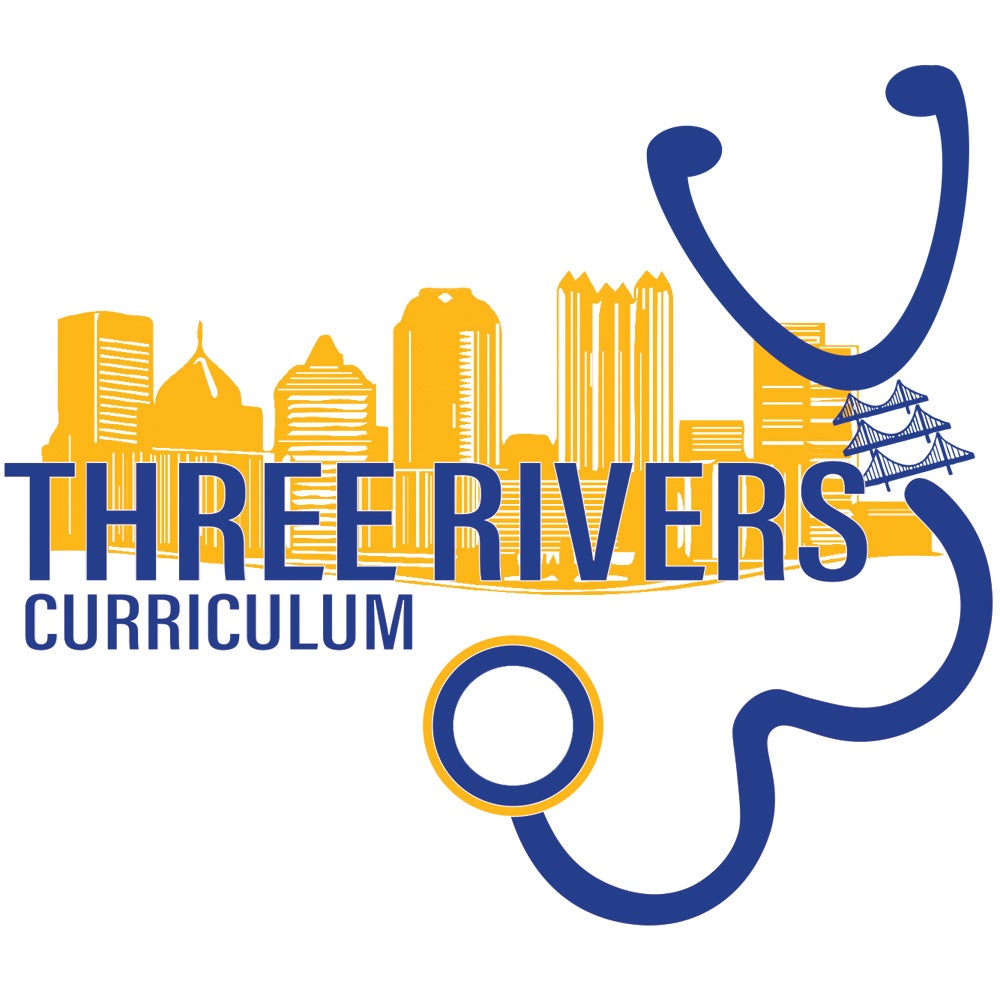Three Rivers Curriculum
This new curriculum consists of a Foundations phase (15 months) that begins in Fall MS1 with an integrated case-based Fall semester focused on basic science fundamentals that is followed by two semesters of organ systems-based periods.
 Coordinated with these structural changes in the preclerkship curriculum is the development of innovative programs including the Primary Care Accelerated Track (PCAT) and the Community Alliance Program (CAP) as well as broader implementation of established programs like the Longitudinal Alliance Program (LAP).
Coordinated with these structural changes in the preclerkship curriculum is the development of innovative programs including the Primary Care Accelerated Track (PCAT) and the Community Alliance Program (CAP) as well as broader implementation of established programs like the Longitudinal Alliance Program (LAP).
Key content threads will run through the entire curriculum, including Social Medicine, Leadership, Interprofessional Education, and Clinical Reasoning.
Foundations (1.5 years)
- Keystone Fundamentals: (Fall MS1) - core knowledge and clinical skills that are important to being a physician and with deep connections to society. Course content builds knowledge complexity as students grow their conceptual framework and clinical exposure.
- Organ Systems: (Spring MS1 & Fall MS2) The second and third semester organ block cultivate a deeper recognition of the interconnectedness of the body’s biological systems with a focus on normal physiology and pathophysiology.
- Patient Centered Care: (Fall MS1, Spring MS1, Fall MS2) This longitudinal course focuses on growing students’ clinical skills including patient interviewing, exam skills, and medical procedures. Settings include hospital/clinic sites and classroom sessions.
- Community Alliance Program (CAP): CAP is an innovative program at the University of Pittsburgh School of Medicine (UPSOM) which aims to value community centered engagement.
- Longitudinal Alliance Program (LAP): LAP involves students building individual relationships with patients living with chronic illnesses over a period of years
Clerkships (1 Year)
Provides students with essential experiences to apply knowledge as you develop competence in the care of patients. These rigorous and valuable clinical experiences provide the clinical knowledge and skills for STEP2CK and prepare students for success in residency. Numerous elective clerkships enable students to tailor the educational experience in alignment with your individual professional and personal goals.
Bridges (1.5 Years)
Differentiation and depth of knowledge are the unique features of this advanced phase of the clinical curriculum. Students dedicate more time to the transition to residence including specialization, clinical skills, scope of experience, and areas of concentration unique to an individual’s interest.
Flex Weeks (5 Weeks)
Flex Weeks are “breaks” in the curriculum that allow students a depth experience in a particular discipline/approach, training them on skills, working on a research or service project, connecting them with an institution or population, helping them be well, or just doing something meaningfully interesting—all at an early stage of their training. Flex week experiences are ungraded exploration, with high flexibility for student activity and independent learning, and minimal demands on educator time.
UPSOM Flex Weeks Menu, 2024-2025: Opportunities & Adventures
Programs
Community Alliance Program (CAP)
The Community Alliance Program (CAP) is an innovative program at the University of Pittsburgh School of Medicine (UPSOM) that aims to value community-centered engagement. CAP partners with community organizations to engage students and faculty in communities of practice that center on community strengths and community-directed goals. Each group of 4-10 students will forge an alliance with a community partner organization to learn and support the work of the partner during the first 15 months of their medical school experience.
CAP hopes to facilitate the development of our students’ professional identity which highlights trustworthiness, cultural responsiveness, restorative practices, and a strength-based mindset to carry throughout their careers.
Longitudinal Alliance Program (LAP)
The Longitudinal Alliance Program (LAP) involves students building individual relationships with patients living with chronic illnesses over a period of years. Students get to know their LAP patients in clinical and non-clinical settings to hear about patient perspectives on health and health care and see how health conditions evolve over time. Students debrief their LAP interactions during small group meetings with a Faculty Facilitator. The program also involves hearing from non-physician health care professionals to deepen our knowledge of interprofessional roles in patient care.
Longitudinal Professional Enrichment Courses (PECs)
A Professional Enrichment Course provides well-structured, rigorous and high-quality experiences in areas not typically available to students. While the majority of PECs are offered during the Flex Weeks, there are a few opportunities to take a longitudinal course.
Streams
Streams are like “minors” for students who are “majoring” in medicine but want an in-depth experience in specific content or skill areas to round out their training.These programs are flexibly designed to allow students to complete requirements around the regular curriculum, culminating in a mark of distinction on their academic record.
Threads (1.5 Years)
Threads are prioritized themes that are integral to cultivating physicians who are devoted to practice and with deep connections to society. Threads include clinical reasoning, interprofessional education (e.g., clinical team management), social medicine, and leadership (including self-awareness and self-management skills). Longitudinal integration of Threads across three semesters allows student to engage with content and skillset both regularly and with increased nuance as a student’s clinical experience and life experience grows.
